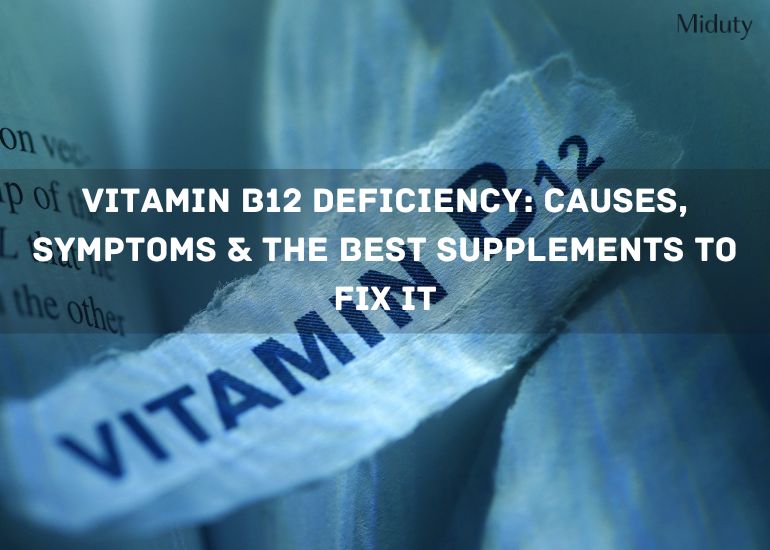
Thyroid Hair Loss: Top 4 Vitamins and Tips for Natural Regrowth
Introduction | What Causes Hair Loss? | Vitamins for Thyroid Hair Loss | Additional Tips | Conclusion | References

Have you ever been diagnosed with a thyroid issue and noticed hair loss as one of the symptoms? You are not alone! Many women experience hair loss due to thyroid problems, and it can be incredibly distressing. After all, hair is often seen as a symbol of beauty and confidence. But when you see your hair thinning or breaking every day, it can feel overwhelming.
A weakened thyroid doesn't just affect hair; it can also lower immunity, leaving the body more vulnerable to other health concerns. Hair loss due to thyroid issues can also impact self-esteem, causing many to feel less attractive and even avoid social situations, which can lead to feelings of isolation and negatively affect mental health.
In this article, we'll dive into the connection between thyroid function and hair loss, explore the best vitamins for thyroid hair loss, and provide tips on how to support thyroid hair loss regrowth naturally. Whether you're just starting to notice hair thinning or have been dealing with it for a while, let's explore solutions to help you regain your hair and confidence.
What Causes Hair Loss in Thyroid Conditions?

Thyroid disorders, whether it's an overactive thyroid (hyperthyroidism) or an underactive thyroid (hypothyroidism), can often lead to hair loss or thinning. The thyroid gland plays a crucial role in regulating metabolism, growth, and development, making it essential for overall health, including the health of your hair.
When the thyroid is overactive, it produces too much thyroid hormone, which can make hair thin, weak, and more prone to breakage. This occurs because excess thyroid hormones disrupt the normal hair growth cycle, damaging hair follicles and causing hair loss. [1] On the other hand, an underactive thyroid doesn't produce enough hormones, leading to dry, brittle, and thinning hair, which can also result in hair loss. [2] Thyroid hormones are vital for the growth and function of hair follicles, so a hormonal imbalance, whether too much or too little, directly impacts hair health.
In addition to hormone imbalances, vitamins are crucial in supporting hair health. Vitamins for thyroid hair loss, particularly those that aid in hair growth, can be beneficial in combating hair thinning caused by thyroid conditions. Ensuring that the body has adequate amounts of essential vitamins can promote thyroid hair loss regrowth and help prevent further hair loss.
In this blog, we will discuss the specific vitamins for thyroid hair loss, foods rich in these vitamins, recommended supplements, and additional tips to support healthy hair growth despite thyroid issues. By addressing the root causes of hair loss due to thyroid problems and nourishing your body with the right nutrients, you can improve your chances of regrowing healthier, stronger hair.
Vitamins for Thyroid Hair Loss
- Vitamin D
Vitamin D is vital for bone health, immunity, and cell growth, but it also plays a key role in hair health. Studies have shown that low levels of vitamin D can contribute to hair loss issues like alopecia and hair loss due to thyroid disorders. [3] Vitamin D helps maintain both new and existing hair follicles, supporting a healthy hair growth cycle. Ensuring an adequate intake of this vitamin can help prevent and promote thyroid hair loss regrowth.
The daily recommended intake of vitamin D varies based on age and individual factors, but most adults need between 600-2000 IU per day. While sunlight is the best natural source, foods such as fatty fish (salmon, mackerel), egg yolks, and fortified dairy products provide some vitamin D.
However, many people, especially those living in low-sunlight regions or prone to deficiency, may need vitamin D supplements to meet their needs and combat hair loss due to thyroid imbalances.
- Vitamin B
The B vitamins, a group of water-soluble nutrients, play essential roles in energy production, red blood cell formation, and hair health. Vitamins B7 (biotin), B3 (niacin), and B12 (cobalamin) are especially crucial for supporting hair growth. Biotin, in particular, is known for its ability to enhance hair thickness and reduce hair loss. [4] In the case of hair loss due to thyroid issues, maintaining adequate levels of B vitamins can help support thyroid hair loss regrowth.
Daily intake recommendations for B vitamins vary, but most adults need a few milligrams of each type per day. Foods rich in B vitamins include fish, chicken, meat, beans, and leafy green vegetables.
In addition to diet, supplements that combine biotin, minerals like zinc, and natural ingredients like saw palmetto and nettle root can provide the necessary support for stronger hair follicles, prevent hair breakage, and promote overall hair health.
- Zinc and Selenium
Zinc is an essential mineral that plays a major role in healthy hair growth and can help prevent hair loss, particularly for those with thyroid-related hair issues. This is because zinc is involved in the production of thyroid hormones, which influence hair follicle development. Many individuals with hypothyroidism, an underactive thyroid, are often low in zinc, and supplementation can aid in reducing hair loss due to thyroid imbalance while promoting thyroid hair loss regrowth.

Zinc works synergistically with selenium, another important mineral. Selenium supports the production of selenoproteins, which are vital for thyroid function and immune health. Together, zinc and selenium help regulate thyroid antibodies, reduce inflammation, and protect the body from oxidative stress all of which can contribute to autoimmune thyroid disorders like Hashimoto's disease.
For optimal results, zinc and selenium supplements are often recommended alongside dietary sources like chicken, legumes, pumpkin seeds, spinach, and mushrooms.
- Iron
Iron plays a crucial role in delivering oxygen to cells, including hair follicles, which is why iron deficiency is a common cause of hair thinning and hair loss, especially in women with thyroid issues.[5] Addressing low iron levels can significantly improve hair health and support thyroid hair loss regrowth.
Most adult women need around 18 mg of iron per day, although individual requirements vary based on age and health. Dietary sources of iron include chicken, fish, almonds, sunflower seeds, and leafy green vegetables like spinach and kale.
However, if dietary intake isn't sufficient, iron supplements may be necessary to restore healthy iron levels and combat hair loss due to thyroid-related deficiencies.
In summary, maintaining proper levels of essential vitamins and minerals such as vitamin D, B vitamins, zinc, selenium, and iron is crucial for managing hair loss due to thyroid issues. By addressing these deficiencies and supporting overall thyroid health, you can promote healthy hair growth and reduce further hair thinning.
Additional Tips for Reversing Hair Loss
While it's important to focus on doing the right things to promote hair growth, it's equally crucial to avoid the wrong habits that may worsen hair loss. Here are some essential tips to help you reverse hair loss, especially if it's related to thyroid conditions.
- Avoid Harsh Hair Treatments
Many of us love to style our hair using treatments like straightening, smoothing, and chemical relaxers. However, these procedures can severely damage hair health. Intense heat and harsh chemicals weaken hair follicles, causing them to detach from the roots, which can lead to significant hair loss over time. Hair strands also become brittle, leading to split ends and a loss of natural strength. For those experiencing hair loss due to thyroid imbalances, minimizing or avoiding such treatments can help preserve hair and promote thyroid hair loss regrowth.
- Steer Clear of Tight Hairstyles
Tight hairstyles, such as braids, ponytails, and weaves, put excessive tension on the hair follicles. Over time, this tension can lead to hair breakage and further hair loss. To reduce strain on your hair, it's best to wear such hairstyles loosely or avoid them altogether. Protecting your hair from unnecessary stress can aid in maintaining stronger follicles and support healthier hair growth, especially when managing vitamins for thyroid hair loss.
- Manage Stress Effectively
Stress is a known factor that can disrupt the body's hormonal balance, contributing to hair loss. Chronic stress can exacerbate hair thinning in those with thyroid-related hair issues. Engaging in stress-relief activities like exercise, meditation, yoga, or deep-breathing exercises can help manage stress levels and improve overall health. Keeping stress under control is particularly important for those working to regrow hair lost due to thyroid conditions.
- Prioritize Quality Sleep
Adequate sleep is essential for overall well-being and healthy hair growth. Sleep deprivation can throw off the body's hormonal balance, potentially accelerating hair loss. Aim for 7-9 hours of restful sleep per night to give your body the recovery time it needs to support hair regrowth. Proper sleep, along with vitamins for thyroid hair loss, can enhance the body's ability to balance hormones and stimulate healthy hair growth.
By avoiding harmful styling practices, managing stress, and ensuring sufficient sleep, you can enhance your efforts to combat hair loss due to thyroid conditions. Combined with a balanced diet and the right supplements, these lifestyle changes can significantly promote thyroid hair loss regrowth and support long-term hair health.
Conclusion
Hair loss due to thyroid disease can be distressing, but it's important to remember that with the right approach, you can promote healthy hair regrowth.
A well-balanced diet plays a crucial role in managing hair loss and preventing further shedding. Incorporating iron, zinc, protein, and vitamins for thyroid hair loss can encourage the growth of stronger, healthier hair. Foods like eggs, fish, nuts, seeds, and leafy greens are excellent sources of these essential nutrients, helping to nourish your hair from within.
Additionally, adopting stress management techniques, avoiding tight hairstyles that cause strain, using gentle hair care products, and ensuring enough sleep are key lifestyle changes that support thyroid hair loss regrowth. It's always a good idea to consult with a healthcare professional to address any underlying issues and find the best treatment plan tailored to your specific needs.
By focusing on these changes, you can regain your hair health and prevent further hair loss caused by thyroid imbalances.

References








